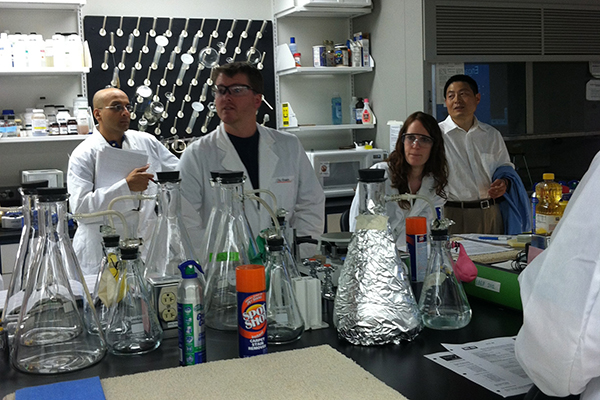Delaware Biotechnology Institute partners with DNREC in biofuel project
10:20 a.m., Nov. 8, 2012–As part of a five-year, $50,000 grant supporting state greenhouse gas reduction projects, the Delaware Biotechnology Institute (DBI) has partnered with the Delaware Department of Natural Resources and Environmental Control (DNREC) in response to the need for 36 billion gallons of petroleum-based fuel to be replaced by biofuels by 2022, according to the Renewable Fuel Standard of 2007.
The Framework for Minimizing Energy Input and Environmental Impact in Delaware grant is a joint effort between DBI and Delaware State University (DSU) to create an education and outreach pipeline, as well as training, for the next generation of scientists and Delawareans as part of a sustainable agriculturally based industrial ecology.
“Given the First State’s rich history in agriculture and plant-based resources, we believe that Delaware is well-positioned to establish infrastructure, education, and technology development programs that will allow us to be a national leader in the biofuel challenge,” says Kelvin H. Lee, principal investigator on the grant, director of DBI and Gore Professor of Chemical and Biomolecular Engineering at the University of Delaware (UD).
With specific goals to educate teachers about alternative energy technologies and foster student interest in science, technology engineering and mathematics (STEM) careers, DBI and DSU developed an education framework to help Delaware in the biofuel challenge.
Moreover, the education framework of this program is being leveraged against a large-scale multi-institutional grant from the U.S. Department of Agriculture’s Agriculture and Food Research Initiative project led by Cornell University.
Cornell has created a multi-state consortium including nine institutions of higher learning from New York, Delaware, West Virginia, Ohio, Maryland and Pennsylvania to address sustainable agriculturally based industrial ecologies and set up educational training programs. Delaware’s initiatives are replicated in these other states.
“Although each site within the consortium implements their own educational plans and professional development workshop for teachers, Cornell gathers feedback from each site with aims of improving all of the programs each year,” says Corinne Johnson Rutzke, director of the National Bioenergy and Bioproducts Education Programs in Cornell’s Department of Biological and Environmental Engineering. “The workshops are for educators who aspire to a high level of leadership in bioenergy and bioproducts education.”
The education component of the program is focused on training the trainer. The program, currently in its second year, teaches outreach coordinators and teachers how to make learning STEM more fun and interactive by incorporating new and exciting lesson plans, activities and labs to demonstrate real-world STEM applications — including the importance of energy alternatives.
The Northeast extension of the program is hosted at Cornell University, covering Delaware, Pennsylvania, Maryland, New York, West Virginia and Ohio. Three weeks of intensive training focuses on global issues such as sustainability, biofuels and environment.
The goal is to not only ignite student interest while bettering STEM education, but to also bring awareness to society, disseminate technological understanding and create a skilled future workforce that can address the technological barriers to the renewable energy challenges their generation will face.
Diane Wuest, a doctoral candidate in chemical and biomolecular engineering at UD and outreach coordinator for DBI, became a master teacher trainer this summer.
“Some of the highlights of the three-week training were the field trips,” said Wuest. “Experiencing a sustainable village first hand and touring a 4,000-head dairy farm that implemented an anaerobic digester to power the entire farm was impressive. This is the future of bioenergy.”
Master teachers then educate more people in their respective states. Shortly after receiving her master teacher certificate, Wuest led a one-week session at DSU teaching program lectures and lab activities based on her training received at Cornell.
“I was able to focus my lessons on what the local participants wanted to learn — in particular, biodiesel production,” said Wuest. “And I taught them how to translate the information into teaching labs and lesson plans with a focus on other STEM disciplines.”
“This initiative is multi-focal,” says Lee. “In addition to facilitating these outreach and extension efforts, we hope to support Delaware’s Race to the Top efforts to improve our state’s education programs.”
Article by Laura Crozier

